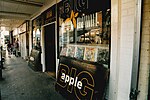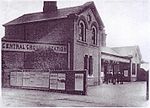Dog & Bull

The Dog & Bull is a public house in Croydon, England. It is a Grade II Listed, 18th-century building with a 19th-century frontage in Surrey Street, on the site of a previous 12th- or 13th-century inn called The Bell. The Dog & Bull was number 24 with an associated yard which was once used as an animal pound when the street was known as Butcher's Row. The pub is now a tied house and part of Young's brewery chain. In the 1990s, the adjacent grocery at number 25 was merged into the pub and the yard was converted into a beer garden. The pub has hosted a variety of events including a formal inquest in the 19th century, regular live jazz music by Don Weller in the 20th century and a religious blessing of its beer in the 21st century.
Excerpt from the Wikipedia article Dog & Bull (License: CC BY-SA 3.0, Authors, Images).Dog & Bull
Surrey Street, London Broad Green (London Borough of Croydon)
Geographical coordinates (GPS) Address Website External links Nearby Places Show on map
Geographical coordinates (GPS)
| Latitude | Longitude |
|---|---|
| N 51.373055555556 ° | E -0.10166666666667 ° |
Address
Dog & Bull
Surrey Street 24-25
CR0 1RG London, Broad Green (London Borough of Croydon)
England, United Kingdom
Open on Google Maps










